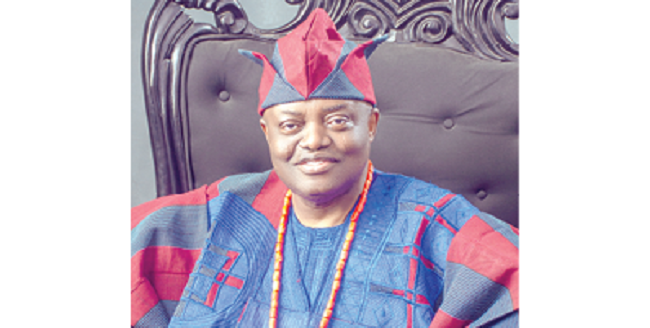As the contest for who becomes the Alaafin of Oyo hots up, over 100 candidates from the traditionally preferred Agunloye family have signified interest. One of the candidates, a United States based general surgeon, Dr Ajibade Adeladan in this interview with SOJI AJIBOLA bares his minds on why he is leaving medical profession to join the contest. Excerpts:
Give us your background
My name is Prince (Dr) Ajibade Adebayo Adeladan of Ilaka Lawuwo Compound, Oyo. I was born into the royal family of the Agunloye dynasty in Oyo on January 4, 1961, to my parents, Prince Samuel Ademola Adeladan, the Mogaji and the current head of the Agunloye Ruling House and Mrs Rachael Folorunsho Adeladan. I attended Nazareth Convent at Ibonwon in Epe for both my nursery and primary school.
I later attended Olivet Baptist High School Oyo, for my secondary school where I later graduated with flying colours as a science student from 1973 to 1977. After my secondary schooling at Olivet Height, I attended the Federal Government College, Ijanikin in Lagos State for my Higher Certificate Education (HSC) from 1977 to 1979 where I studied Physics, Chemistry and Biology. I graduated with the best results from the Federal Government College. I attended the University of Ibadan where I studied Medicine and did my clinical at the University College Teaching Hospital (UCH), Ibadan.
I later worked at various hospitals in Lagos, private hospitals like Ajayi memorial hospital and Alalade memorial hospital, helping to save lives and improve the health and well-being of different people from all walks of life. I also attended the Lagos University Teaching Hospital where I specialised in surgery and then became a Fellow of the West African College of Surgeons (FWACS) in 1995, within a record time. In search of knowledge and in a quest to offer and provide the best medical service to humankind, I left the shores of Nigeria.
I worked as a surgeon in several Caribbean nations, Including Jamaica, The Turks and Caicos Islands, British Virgin Islands and finally at the United States Virgin Islands. After acquiring much knowledge in my profession, I decided to move to the United States, where I did a specialist training in Psychiatry at the Ivy League Colombia University in Manhattan, New York City. I was appointed Chief Resident at this institution. I became certified in Psychiatry and Neurology in April, 2009. I also became board certified in Addiction Medicine In 2012. In the USA, I have worked in different states and medical facilities, including New York, Nebraska, South Dakota, North Dakota, Colorado and the state of California. Despite my travels of the world, I still visit home periodically making consultations and helping people medically and providing health care for many indigent people in Oyo and in Nigeria at large. I never for once forgot my roots, where I came from and who I am. I keep up to date with the situation at home in Oyo.
Why did you join the race late?
I am not coming so late. Even though I work in the United States, I have actually been coming to Oyo virtually every year. The late king passed on in April 2022 and shortly after he passed, we began to talk about all of these.
I have participated in the process, including taking my name to the relevant people and the Babayaji in Oyo town. We were about 89. Actually, we were initially about 119 candidates, then it dropped to 89. Then, 65 of us were interviewed. The kingmakers are aware of my candidacy.
You said you slowed down the process in the course of your brief remarks, now you are reigniting your process, why?
Yes! At the time we initially started, we had to do interviews. I did an interview with the Nigerian Tribune, but we were being advised because of what was going on at that time. There was a bone of contention. People were coming out, saying they were this when they were not. They said everybody should calm down, hold on and do what we need to do. Oyomesi has interviewed all of us. But there are people who wanted to take the government to court, who wanted to take the Oyomesi to court and which they actually did. Some of them are still in court saying that they were not allowed to be interviewed and that they also belong to the royal family. The general election was coming at that time among other things. The government did not even have time to look into the issues and Ogbomoso was also having their own issues. Iseyin also lost their monarch then. So, there were many things taking up the time of the government. It was generally advised that we should slow down at that time.
Why do you want to return to Nigeria at this time that many young people are leaving? With your flourishing career, why do you want to come back to Oyo?
You will not be the first person to ask me that question – even in the United States, among my co-workers, they ask me every now and then. Just before I came, they asked me, ‘why do you want to leave California for Nigeria?’ But I always tell them, Nigeria is the biggest economy in the whole of Africa and there are many opportunities in Nigeria. Also, there are many people I think I can be of help to in Nigeria. With all my experience in the medical field, I am very much interested about agriculture. Why? Because I worked in Nebraska. Nebraska is an agricultural state. I have interacted with farmers. I interacted with ranchers and I came to Nigeria, but the needed things are not there. Farms are small. In Nebraska, you can drive and you see corn, wheat for more than 100 miles.
So, I said to myself, we can do all these too in Nigeria. We may not be able to build planes, build rockets or submarines but we can at least do all those things. We should be able to generate electricity, we should be able to have agriculture, especially in Nigeria. We should be able to take care of all of them. And now came the opportunity. Biologically, I belong to the royal family and it is now the turn of our ruling house. I see myself as eminently qualified to do it and my family is also in support of that. So I said well, I think, I can do this and my interest has been growing since then.
Now, I am more confident that it’s something I ought to do to be of help to people. If you are in the western world and you are comfortable, it’s okay. But if you come back to your own place, with the experience and ideas, you can begin to do things differently. You can begin to do things that will be of benefit to your people when you are back here.
I have been to the Caribbean for instance, these are very small countries. Jamaica’s population is probably five million. The most popular country there is Cuba with about 10 million. Lagos alone is about 20 million and in all these small countries, they have everything. There is water supply, electricity is 24 hours, and they have all these things. Yet we have about 250 million people and we cannot take care of things. I feel that with all those experiences I have had, if I come to a place like this, I should be able to be of help, I should be able to contribute my own quota. And I think that being an Alaafin, an Alaafin that is experienced, will be of huge benefit, not only to the people of Oyo, but to the people of Oyo State, Southwest and Nigeria as a whole.
Is your family still based in the USA?
Yes! They are based in the United States.
Are they thinking of coming back to Nigeria with you?
Well, not now because I have a 12-year-old son and he is going to be schooling there for some time. He is going to be coming to Oyo as frequently as possible. Everybody is going to be here.
You were talking about agriculture, have you started? Do you have land that you are already cultivating in Oyo?
No! But I have identified land. I have identified places where these things can be done.
Have you started doing anything on agriculture in Oyo?
No! We are on it. Remember my father is an agriculturist, we talked about that. We are coming up with plans. We have talked about that.
The late Alaafin left Oyo on a pedestal that is very high in terms of culture and tradition, do you have what it takes to fit into that shoes? Secondly, one of the things that is lacking in Yorubaland is unity, what is your advice for the traditional rulers?
Starting with the second question, it is a big thing. I’ve been thinking about that actually. If you look at Oyo, there are some other smaller towns in Oyo like Awe, Fiditi, Ilora, Afijio – all these towns, settlement or areas are part of Oyo. You remember that Oyo Empire extended from River Niger in the North to the Atlantic Ocean in Lagos. So, Oyo as it is now and the surrounding areas are purely modern. For Awe and all those areas, there have to be interactions.
Alaafin as the head needs to be meeting with the heads of those places. They need to sit down and talk about how culture can be promoted, how the whole place can be developed.
There has to be unity and this is why I am saying meet with people, the heads of those places. Let people speak out their minds about what has been wrong, what has not been done well, what has been problematic in the past and what has been preventing people from coming to develop the place. If we can be united in Oyo, then the whole of Oyo State can be united, and then the whole of Yoruba land.
For the first part of your question, there’s a lot to be said about that. Remember I mentioned when I was talking initially about Alaafin Lamidi Adeyemi. He has peaked on culture and to a large extent that has to be continued. For example, the promotion of Yoruba language is going to be paramount. It used to be, you have to pass English and Mathematics before going to the university in Nigeria. But I think Yoruba should be included for you to go to university in South West. You need to be able to speak Yoruba language very well. You need to have a pass in Yoruba language. It’s going to start from there. Now Oyo is full of traditions and there are people who try to bring modern religion into things. Everybody should be able to do what they want.
Alaafin is the head of all – the Muslims, Christians and Onisese (traditionalists). They are all under him. He should encourage traditional things, not religion. When you talk of religion there are Christians, Muslims that will stand up against such. As an Alaafin, you must encourage everything that needs to be done. It doesn’t mean he has to participate in everything that people are doing but he should promote the culture.
There are cultural things that we don’t practice anymore. Some are good and some are not good. Everywhere in the world, there used to be a time when people come out naked or were doing sacrifice. But they don’t do that anymore. There was a time when the king dies, someone has to die with him. But they don’t do that anymore. There are other things you can encourage. For instance, children must respect their parents and all that, like the Omoluabi – all those things have to be encouraged and promoted.






